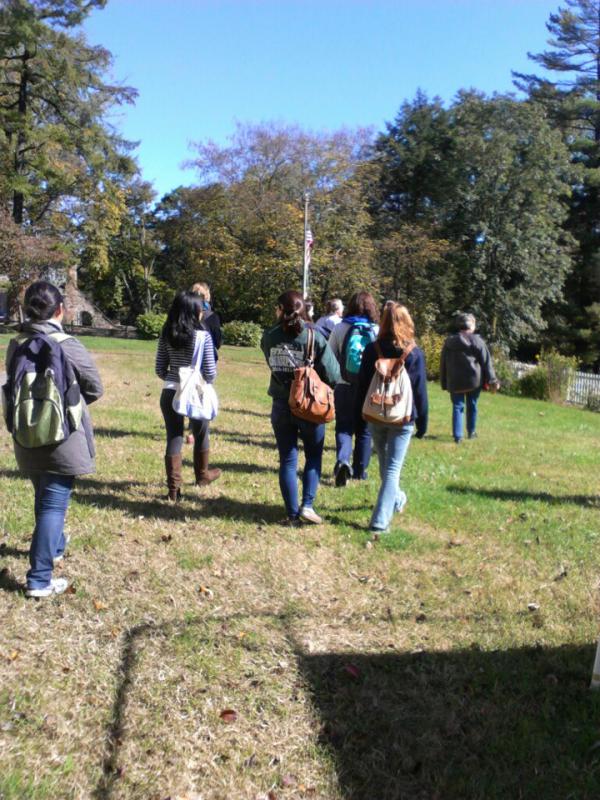Serendip is an independent site partnering with faculty at multiple colleges and universities around the world. Happy exploring!
Blogs

(Mental) Construction Zone
My assignment for our trip to Ashbridge was to hold an online reflection of my shared experience with the class. That can be found here. Something that our blind shuttle made me think about was the difference between hearing r.graham.barrett and eetong’s auditory description of the history (past and present) of Ashbridge Park and the waterway restoration, and the visual differences I encountered that were in contrast to the mental image I had constructed. I wasn’t really expecting the trash, especially after hearing about all the conscious efforts to revitalize and preserve the area. I assume if I did not have my sense of sight that I would have retained the visual image I constructed from the stories, unless perhaps I had someone describing the reality to me. Carmen Papalia said on our blind shuttle that not having sight could be a beautiful thing, that sight gave us so much to be distracted by that our other senses don’t work as hard as they could. I am now left wondering how my experience at Ashbridge might have been different if I had taken some time to close my eyes. Would I have had a more watery experience if I let me ears and nose take over, uninhibited by the distractions my eyes plagued me with?

Thursday's Silence Class
"Sometimes it's harder to attain inner silence than outer silence. The dog stopped barking and the kids have gone to bed, but your mind has a lot to talk about and it knows you can't pretend you're not at home." -Linda Solegato
I stumbled across this quote today and it reminded me of Thursday's class with Professor Beard. I thought she had such a peaceful presence about her, but the end of the conversation made me a little uncomfortable. We talked about the Chittister text and our discomfort with silence because "it is silence that brings us face to face with ourselves" (Chittister).

Gathering quotes for Tuesday's barometer
As you read over your classmates' papers, pull out one sentence you would like to discuss further, and BY MONDAY @ 5, ADD IT HERE AS A COMMENT. I will draw from these in constructing the game of "barometer," which we will play in class on Tuesday. Thanks!

PLANS FOR OUR FINAL TEACH-IN
We have 8 presentations--so each one gets 10 minutes. I will be very strict about the time-keeping, since we want to give everyone an equal chance to share what they have learned. Here's the program:
11:25-11:35 Minh
11:35-11:45 Sarah C
11:45-11:55 Shengjia
11:55-12:05 Wanhong and Barbara
12:05-12:15 Susan, Rochelle and Sara
12:15-12:25 Alex and Hannah
12:25-12:35 Claire and Zoe
12:35-12:45 Maddie and Elizabeth
If you have technical needs, you need to get there early and get yourself set up (otherwise, setting up becomes part of your performance time, and we all get frustrated....)
I'll bring some treats--and am very much looking forward to this!

Two thousand days and nights (Unfinished)
Final Version:
My armor weighs more than I can still carry,
A cage for my skull,
Five years empty inside.
Circean shapeshifters sold me this
Sheathing.
In shadows they flitter, in daylight they hide.
Remember:
Effortless solstice of winter,
Sleeping,
Turning, legs and arms twined.
Human cocoon
Of breath, skin, Elysium,
Flawless empyrean, fullness of mind.
Now
Skating the precipice, dragging my baggage,
Punch hard,
Pierce through this carapace shell.
With unguarded organs
I squint through the scissure,
Unable to tell if it's heaven
Or hell.
Exoskeletal shedding takes trust,
Though I can't seem to know when it's false or it's real,
But If i touch heat then
I'll maybe be able to
Cry
and then actually, finally
Feel.

The Gilted Fish Bowl
I thought going back to my site sit would be scary. I've walked past the tree a few times, and it's lost most of its leaves. Its silver branches and a some auburn, dead leaves (mostly on one side of the tree) are all that remain of the lush, green tent I used to sit in. I went to my site sit when it was dark, too, so I thought that I wouldn't feel very comfortable in the tree anymore. But, the only really unsettling thing about my site sit was that all of the leaves were gone. People could see inside and I could see them with remarkable clarity. The tree has changed it's physicality for the season, and its atmosphere has, too. The frightening mystery I first felt at the beginning of the semester would have been gone even if the tree had kept its green leaves. The tree and I are pretty "chill" now. I wouldn't say that we're going to be best friends any time soon, but I've gotten used to it, at least a few branches of it. I don't know what I'll do in the tree when the semester is over, but I think I'll visit from time to time to say hello.
The Beauty of Subjectivity--For All Nature Writers

My Ecological Imaginings Class at Bryn College led me to an amazing adventure, rather than journey, to explore the concepts of nature and write about it. The most important thing that I have noticed, after writing essays and participating in class discussions, is that there should be no scale for writing nature when we are thinking ecologically. It is important for every nature writer to know that there is always an essential and unavoidable diversity in writings due to various personal background and beliefs, and what we should try to do is, rather than objecting other peoples’ opinions severely, developing new ideas based on them.
The author of almost every reading material for our class was trying to tell us how we “should” perceive the relationship between human and nature or what the standard of “good, natural” writing is, and it had taken me a long time before I realized that I could academically benefit from their seemingly judgmental ideas. In his introduction to The Dream of the Earth, Thomas Berry wrote that “we must now understand that our own well-being can be achieved only through the well-being of the entire natural world about us” (<?xml:namespace prefix = st1 />Berry, Introduction XV). In Women Writing Nature—A Feminist View, Barbara J.

Throwing Away Typical Environmentalist Assumptions
If you are a young urban denizen pursuing higher education that lives in the city and is up-to-date with the environmental news of this century, you have been fed information by a number of ecological writers, given “environmentally conscious” advice to get yourself out of your home and “experience nature.”
Chaos left unanswered
It is very difficult for me to write the last site sit. The rain is seeking into my hair; my head is aching with reflections of how this semester had been for me. I couldn’t help to take retrospective examination of myself and my site. The exuberance beech trees I see from “Carpenter beach” have only a few leaves left now. People loved to lie on the beach at the beginning of the semester haven’t returned for a long time. The grass stayed relatively the same: well-trimmed. My mind is not well-trimmed but muddy and clustering like the fallen leaves in the corners and sides of the trials.
The voices of the ecologists were arguing in my head. Are human doomed by human’s encroaching the earth? Or is the environmental crisis just an imagination of some ecologists? How should we represent the world? Can we compose an understandable literature without human as a subject? Or is human an inseparable part of the ecology? What shaped the actions of human in the nature environment? Is it the fear of nature or the control of the landscape? How should we speak green? Radically or simply let it be and enjoy what we have now…
Many questions are still left unanswered. Many topics are still open in the untamed space of imaginations. Even though the class is coming to an end, I don’t think I can simply left the chaos of the different world views, opinions and imagination in the readings we have done. There is much I can ponder on for years.



